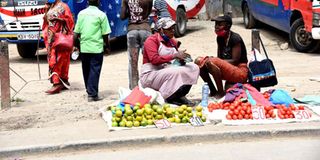Reopen the country, Mr President, this economy can’t take any more

Hawkers displaying fruits and tomatoes for sale along Haile Selassie Avenue in Nairobi on June 1,2020.
What you need to know:
- There is no reason to think that travelling from Makuyu in Murang’a to Nairobi and back is any more dangerous than travelling from Machakos or Ongata Rongai to the city.
- My humble suggestion is that reopening the economy by easing all travel restrictions may be risky at first, but not necessarily senseless.
President Uhuru Kenyatta is on Monday set to announce a major decision that could make him popular with a huge number of Kenyans, but also earn him criticism from people who never take the time to look at both sides of an issue.
Unless the Covid-19 situation will have changed by then, he will reveal the government’s decision on whether to open up the country or to continue with the measures that have been deemed necessary to contain the coronavirus. To do the former risks an escalation of infections, but to do nothing is infinitely worse.
It is likely the government has already made up its mind, but one thing remains clear; choosing between whether to protect lives or revive the economy and allow people to travel freely requires the sagacity of Solomon.
This is a dilemma of epic proportions, but judging from the fact that the number of infections is inexorably rising daily, isn’t it time to either put the whole country under lockdown or to open it up and rely on divine providence?
STRINGENT MEASURES
Measures like curfew, partial lockdown of hotspots, closure of entertainment joints like bars and other venues like houses of prayer and institutions of learning do not seem to be working as well as hoped, which is why the government should take a hard-nosed decision and either relax all restrictions and hope for the best, or impose even more stringent measures and hope that, somehow, the country will survive.
Neither of the two prospects is appealing or even practicable, but in the end, something will have to be done, and this for a simple reason.
Already, the country’s public health system, never robust in the first place, is on the verge of collapse. The government tacitly admitted this when last month Health Cabinet Secretary Mutahi Kagwe announced that those who do not show any obvious symptoms of Covid-19 infection will be taken care of at home to ease the pressure on hospitals.
This strategy appears to be working well so far and should be extended to rural areas. However, not everyone can go into isolation at home. Since absolute poverty is a disease on its own, millions who live in crowded slums cannot be expected to recover at home.
This desperate measure was taken when it became clear that the country does not have adequate isolation, quarantine or intensive care unit (ICU) facilities, nor does it have enough testing kits, ventilators, or even personal protection equipment (PPEs), which are absolutely necessary for healthcare workers.
This, essentially, means that as we approach the peak of infections during which hundreds will be diagnosed with the virus daily, the healthcare system may become overwhelmed, with dire consequences.
FRUSTRATION
Should we, then, conclude that nothing can be done, throw our hands in the air in frustration, and leave it all to the Almighty? If the universal consensus is that imposing a countrywide lockdown is practically impossible, what is the way forward?
It has not been established that relaxing the curfew hours has raised infection rates —other factors are obviously at work, including the fact that the number of those tested daily has been rising. Nor has allowing people to eat in hotels made them more vulnerable to infection. Therefore, it should be assumed that opening up the country may not make too much of a difference.
My humble suggestion is that reopening the economy by easing all travel restrictions may be risky at first, but not necessarily senseless. The reasons Nairobi and Mombasa remain Covid-19 hotspots are elementary: high population densities lead to overcrowding while endemic poverty among thousands of urban dwellers, lack of personal hygiene essentials like soap, running water, sanitisers or even face-masks, make the challenges worse. So does general nonchalance among people driven to the wall by lack of fundamentals like food and jobs.
TRAVEL RESTRICTIONS
For these and other reasons, I say: relax travel restrictions and open up the country. There is no reason to think that travelling from Makuyu in Murang’a to Nairobi and back is any more dangerous than travelling from Machakos or Ongata Rongai to the city. There should be no reason why a hawker cannot fetch mitumba from Gikomba to go sell them to fellow villagers in Rironi. I know of a Gatundu businessman who had a thriving business in Thika town, but he had to shut it down and now whiles away his time drinking home-made brews.
The only exceptions should be schools, bars and lodgings, and anywhere else people congregate for activities that are not essential for life itself. If measures like social distancing, mandatory wearing of face-masks in public and general hygiene precautions are strictly enforced, it may be possible to contain infection rates.
Having said that, whatever the President announces on Monday will not be wrong. This is not a matter of right or wrong; we are in the middle of a global pandemic.
Mr Ngwiri is a consultant editor. [email protected]





